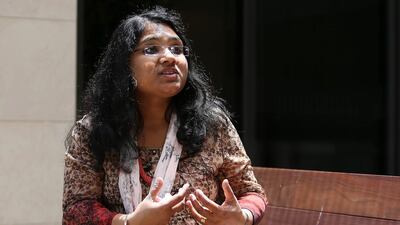DUBAI // A six-month-old child sold by her mother, a 12-year-old who witnessed domestic violence and a seven-year-old forced into begging.
These are some of the alarming cases at a Dubai women’s and children’s shelter that has experienced a 38.5 per cent rise in cases in one year.
Victims of child abuse made up 41 per cent of cases, while there was a 70 per cent surge in domestic violence cases.
The Dubai Foundation for Women and Children helps victims of domestic violence, child abuse and human trafficking in the country.
Last year, it dealt with 414 cases and received 2,203 calls to its emergency hotline – up from 299 in 2012.
The increase mirrors a national trend. The number of cases involving abuse of spouses or children in Abu Dhabi increased from 313 in 2010 to 840 last year, according to figures released by Mohammed Al Danhani, head of family prosecution at Abu Dhabi Public Prosecution.
Meanwhile, the Federal National Council is considering a proposal for a new law to define and guarantee women’s rights. Its aim is to combat domestic violence, safeguard women’s health and unify support services in the seven emirates. The newly formed Human Rights Committee of the Federal National Council views the proposed new law as a natural progression from the Child Rights law passed this year.
According to Dubai Foundation for Women and Children, most of the children entered the shelter with their mothers, but some were alone.
Their ages ranged from one month to 16 and they were either physically abused, neglected, had witnessed domestic violence, or been emotionally or sexually abused.
“There is an increase probably because of the awareness being created – the community awareness from different media,” said Anita Sunil, the foundation’s clinical psychologist.
“They know that there is help available somewhere.”
Ms Sunil explained how every case has its own challenges.
“Everything is difficult. It is really tough dealing with domestic violence,” she said. “Violence is something nobody can stop.”
Last year, the centre dealt with 29 cases of domestic violence – a 70 per cent increase from 17 cases in 2012. All of the women were emotionally abused and most were physically abused.
When it comes to human trafficking, one of the biggest challenges is the language barrier, because most of the victims are foreigners and lack education.
“Some of them don’t know how to write their names or read,” Ms Sunil said. This also leads to trafficked victims not knowing what visa they are on, which could further complicate their case.
The centre dealt with 15 victims of human trafficking last year – their ages ranging from six months to 33. “They are abused emotionally, sexually, financially and physically,” Ms Sunil said. “In all these cases we find that there is something that stops the person from calling or taking support. They fear threats from the abuser, the social stigma, or typically because of low self-esteem, shame, fear of further abuse, conditioning, inability to financially provide for themselves and their children.”
The foundation has shelters where victims can stay for a period of up to six months.
“I do an empowerment group here for all the victims, to help them cope with abuse or rebuild their lives, with focus on improving their self-esteem, confidence, level of communication and well-being.”
In some cases, a husband may turn against his wife once he finds out she has called for help. According to Ms Sunil, he might think that the wife is turning against him and can get defensive. However, the foundation’s main concern is to help families to reconcile.
“We are not here to break relationships. They need to learn effective coping strategies and know their basic rights. But some of the ladies need more strength.”
When it comes to children, Ms Sunil said it may be hard to determine if he or she had been abused, especially since in some cultures physical punishment is common. Therefore, the foundation uses screening techniques, as well as school and home visits.
The results of therapy sessions and family mediation are mostly positive, although abuse sometimes continues even after the foundation has intervened.
“I think it’s our social responsibility to work towards protecting our children and creating awareness in our community or society, to make childhood a happy and memorable experience. Even if you don’t have a child, I think it is your responsibility living in a community or society to work on it.”
nbakhsh@thenational.ae

